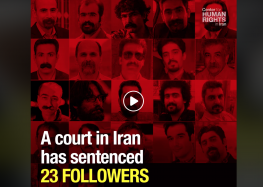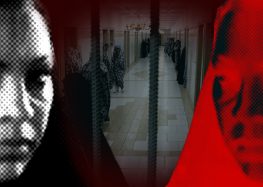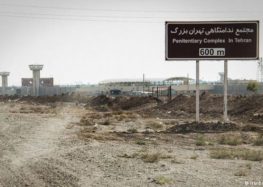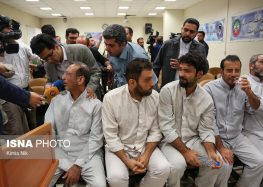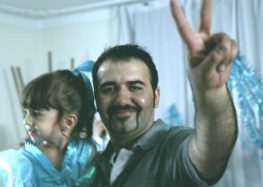Sufi Bus Driver Sentenced to Death in Iran For Killing Policemen
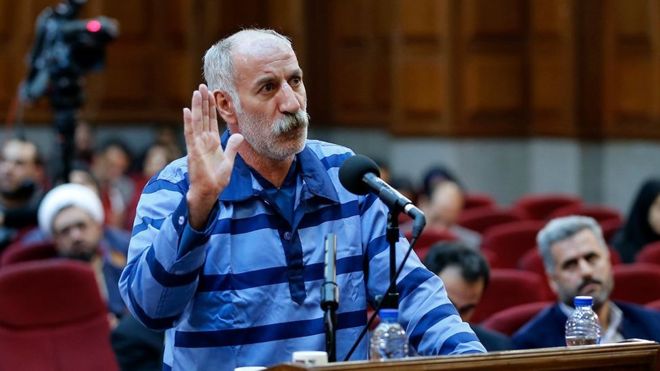 Death of Sufi in Custody Goes Unpunished
Death of Sufi in Custody Goes Unpunished
Updated on April 5, 2018: The Appeals Court in Tehran confirmed the charges against Mohammad Salas and issued three death sentences to him. Judge Mohammad Shahriari, the head of the Judiciary’s criminal division in Tehran, made the announcement on April 4, 2018. He added that Salas had also been given a prison sentence for “disturbing public order” but did not reveal the length of that sentence.
Mohammad Salas, a member of a Sufi order in Iran known as the Gonabadi Dervishes, has been sentenced to death for killing three policemen during clashes in Tehran between members of the minority faith and security forces in February 2018.
While Salas’ prosecution was swift, there has been no investigation into the death of Mohammad Raji, a Gonabadi dervish who died after being arrested during the clashes.
Salas, who insisted his action was not deliberate, has 20 days to appeal the ruling issued by Judge Mohammad Reza Mohammadi Kashkooli of Branch 9 of the First Criminal Court of Tehran on March 19, 2018.
On the third and last day of his trial on March 18, Salas plead not guilty to the charge of “disturbing public order” and argued that he accidentally killed the policemen while trying to “drive away” from the protests that day.
“I got into the bus to drive it toward the police station,” he said. “I drove slowly so that the police could move aside. I flashed my headlights and honked the horn as I went forward. My foot was on the accelerator,” he said, according to the Fars News Agency, which is affiliated with the hardline Islamic Revolutionary Guard Corps.
Salas continued: “We [dervishes] are human beings, not animals. As I stand here, I ask God to grant patience to the victims’ relatives and forgiveness for myself. I am sad. I’m not saying these things to escape execution. I would love to be executed. I just wanted to drive away from the disturbances. I didn’t go over them [policemen] deliberately. My conscience is clear. It was God’s will; even if 50 people had died… I don’t want to go back to society. I don’t want to live.”
Three weeks before the trial, the Tehran police chief vowed that Salas would be executed for causing the deaths of the policemen.
“With the coordination that has taken place with the judiciary, the bus driver that drove over the policemen will be punished by hanging before the end of the [Iranian] year [March 20, 2018],” Tehran Police Chief Gen. Hossein Rahimi said on March 1 in an interview with the state-funded Islamic Republic of Iran Broadcasting (IRIB).
“We are very pleased that despite the high volume of cases in the courts, we were able to investigate this case in the quickest time and bring it to a conclusion,” Gholam-Hossein Esmaili, the chief prosecutor of Tehran Province, told the semi-official Iranian Students News Agency after the verdict was issued.
The Gonabadi Dervishes’ interpretation of Islam differs from that of Iran’s ruling Muslim Shia establishment. The Islamic Republic views any alternative belief system, especially those seeking converts, as a threat to the Shia majority population in Iran and has imprisoned dervishes and expelled them from universities as part of an ongoing persecution campaign.
Some 170 dervishes were hospitalized after police forces tried to shut down a demonstration in Tehran by members of the Sufi order on February 19 and 20.
At least one dervish died after being arrested. Mohammad Raji, a former IRGC commander and Iran-Iraq war veteran, passed away sometime between February 20 when he was detained, and March 4 when his body was identified by a relative.
The clashes broke out on February 19 after the police opened fire on a group of dervishes who were demanding the release of one of their fellow faith members from a police station in the Pasdaran neighborhood of Tehran near the home of the dervishes’ leader, Nour Ali Tabandeh.

